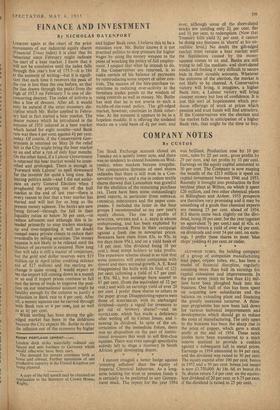COMPANY NOTES
By CUSTOS
THE Stock Exchange account closed on Tuesday on a quietly lower note, and there was no tendency to extend business on Wed- nesday, when markets became irregular. The comparative firmness of steel shares indicates that there is still trust in a Con- servative victory, and a rise in cotton textile shares showed that Lancashire was grateful for the abolition of the remaining purchase tax. There have been some outstandingly good reports, in particular from IMPERIAL CHEMICAL INDUSTRIES and the paper com- panies. I included the latter in the four groups I recommended as my new year's equity choice. The rise in profits of BOWATER, SPICERS and A. E. REED Is almost embarrassing, and has been exploited by the Beaverbrook Press in their campaign against a fresh rise in newspript prices. Bowaters have risen from 83s. to 97s. in ten days (now 95s.), and on a yield basis of 3.8 per cent. (the dividend being 18 per cent.), must tempt holders to take profits. The expansion scheme ahead is so vast that , some investors will prefer companies with slower and more normal growth. A. E. Reed disappointed the bulls with its final of 123 per cent. (allowing a yield of 4.7 per cent. at 83s. 9d.), but earnings have soared to 85 per cent. (from the equivalent of 32 per cent.) and with an earnings yield of over 20 per cent. I prefer these shares to others in the paper group. Disappointing reports were those of WHITBREAD, with its unchanged dividend—surely a signal for investors to get rid of brewery shares?—and DE HAVILLAND, which has made a deficiency after writing off its Comet kisses, and i.. passing its dividend. In spite of the un- certainties of the immediate future, there was no disposition on the part of institu- tional investors this week to sell first-class equities. There was even enough speculative activity left to stage a• recovery in South African gold developing shares. was brilliant. Production rose by 10 per cent., sales by 25 per cent., gross profits by
29 per cent. and net profits by 33 per cent. Earnings on the equity capital amounted to 30 per cent. The Company is now reaping the benefit of the £213 million it spent on capital investment between 1946 and 1953. Recently it brought into production its first terylene plant at Wilton, on which it spent £20 million, and two other chemical plants at Billingham and Ardeer. 1955 prospects are therefore very promising and it may be something of a guide that chemical exports are running 25 per cent, ahead of 1954. ICI shares came back slightly on the divi- dend, being 10 per cent. for the year (against an equivalent 73 per cent.) and at 42s. ex dividend return a yield of over 43 per cent. on dividends and over 14 per cent. on earn- ings. 1 prefer these shares to most 'blue chips' yielding 43 per cent. or under.
GLYNWED TUBES, the holding company of a group of companies manufacturing lead pipes, copper tubes, etc., has been a model of financial discipline, regularly retaining more than half its earnings for capital extensions and improvements. In the past seven years no less than £11 mil- lion have been ploughed back into the business. One half of this has been spent on acquiring new subsidiaries and the balance on extending plant and financing the greatly increased turnover. A three- year programme has now been laid down for various technical improvements and developments which should go to reduce the costs of manufacturing. The only upset to the business has been the sharp rise in the price of copper, which gave a stock profit at the end of 1954. These stock profits have been transferred to a stock reserve account to provide a cushion against a subsequent fall in metal prices. Earnings in 1954 amounted to 84 per cent. and the dividend was raised to 30 per cent. The equity capital after 100 per cent. bonus in 1952 and a 50 per cent. bonus just issued is now £1,750,000. At 18s. 6d. ex bonus the 5s. shares return 5.4 per cent. on the equiva- lent dividend of 20 per cent. or 6.75 per cent. if the dividend is raised to 25 per cent.










































 Previous page
Previous page